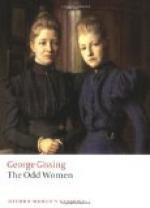I don’t like to leave her,’ the other whispered back. ’But I certainly think it would be better for you to have fresh air. Wouldn’t you like to go to church, dear? The bells haven’t stopped yet.’
The elder sisters were not quite regular in their church-going. When weather or lassitude kept them at home on Sunday morning they read the service aloud. Monica found the duty of listening rather grievous. During the months that she was alone in London she had fallen into neglect of public worship; not from any conscious emancipation, but because her companions at the house of business never dreamt of entering a church, and their example by degrees affected her with carelessness. At present she was glad of the pretext for escaping until dinner-time.
She went forth with the intention of deceiving her sisters, of walking to Clapham Common, and on her return inventing some sermon at a church the others never visited. But before she had gone many yards conscience overcame her. Was she not getting to be a very lax-minded girl? And it was shameful to impose upon the two after their loving-kindness to her. As usual, her little prayer-book was in her pocket. She walked quickly to the familiar church, and reached it just as the doors were being closed.
Of all the congregation she probably was the one who went through the service most mechanically. Not a word reached her understanding. Sitting, standing, or on her knees, she wore the same preoccupied look, with ever and again a slight smile or a movement of the lips, as if she were recalling some conversation of special interest.
Last Sunday she had had an adventure, the first of any real moment that had befallen her in London. She had arranged to go with Miss Eade on a steamboat up the river. They were to meet at the Battersea Park landing-stage at half-past two. But Miss Eade did not keep her appointment, and Monica, unwilling to lose the trip, started alone.
She disembarked at Richmond and strayed about for an hour or two, then had a cup of tea and a bun. As it was still far too early to return, she went down to the riverside and seated herself on one of the benches. Many boats were going by, a majority of them containing only two persons—a young man who pulled, and a girl who held the strings of the tiller. Some of these couples Monica disregarded; but occasionally there passed a skiff from which she could not take her eyes. To lie back like that on the cushions and converse with a companion who had nothing of the shop about him!
It seemed hard that she must be alone. Poor Mr. Bullivant would gladly have taken her on the river; but Mr. Bullivant—
She thought of her sisters. Their loneliness was for life, poor things. Already they were old; and they would grow older, sadder, perpetually struggling to supplement that dividend from the precious capital—and merely that they might keep alive. Oh!—her heart ached at the misery of such a prospect. How much better if the poor girls had never been born.




